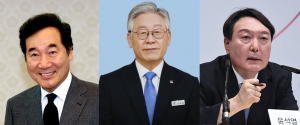Several presidential hopefuls across the South Korean political spectrum have officially thrown their hat in the ring for next spring’s presidential election. With these declarations, as well as shakeups in the leadership of the main conservative opposition party, we are beginning to get a view of what South Korea’s political landscape will look like after President Moon Jae-in completes his single term.
While there have been many candidates who have declared their intention to run from across the political spectrum, so far at least three major contenders have officially declared their intention to run in the upcoming presidential election, which is slated for March 2022. On the ruling party side, former Prime Minister Lee Nak-yon and the current governor of Gyeonggi province, Lee Jae-myung, have officially launched their campaigns.
Lee Nak-yon has been in politics for years in various roles, including as a governor, member of the National Assembly, and leader of the Democratic Party. With this resume, he’s a more insider candidate, one seen as more of a successor to Moon. Lee Jae-myung, on the other hand, is seen as an outsider to the Moon camp, having run against him in the 2017 presidential primary.
While the former prime minister was an early frontrunner, Governor Lee has recently surged ahead in popularity as the public began more fully turning away from the current administration. In recent polling from Realmeter, Lee Jae-myung has the backing of 22.8 percent of respondents, while Lee Nak-yon only has 8.4 percent.
However, both of these ruling party hopefuls lag behind the current leader of the race, former Prosecutor General Yoon Suk-yeol. Yoon has set himself up as the flag bearer for the opposition, despite not officially being a part of any particular party. In particular, his attempts to block the Moon administration from reforming the prosecutor’s office, over which he eventually resigned earlier this year, have made him popular amongst conservatives and those looking for a change-up in the Blue House.
Also on the opposition side, at least one other contender, former head of the Board of Audit and Inspection (BAI), Choe Jae-hyeong, also expressed interest in entering politics but did not specifically declare that he will run for the presidency. Choe resigned from the BAI last month after clashes with the Moon administration, which would likely put him on a similar path as Yoon if he should decide to run.
Meanwhile, the main opposition People Power Party is going through a transformation of its own, electing 36-year-old political outsider Lee Jun-seok to be its new party leader, and following that up with the selection of two 27-year-olds to serve as the party’s spokesmen. These moves, along with the party’s success in recent Seoul and Busan mayoral races, have boosted the conservative party’s membership and its confidence heading into the important presidential primary season.
On the Democratic Party side, the main obstacle will likely be bridging the party’s division along pro- and anti-Moon lines in time to unite behind one candidate. For the opposition, they will need to focus on recruiting the current frontrunner, Yoon, into their camp officially, and, if they are successful, working to maintain his momentum over the next nine months before the election.

































